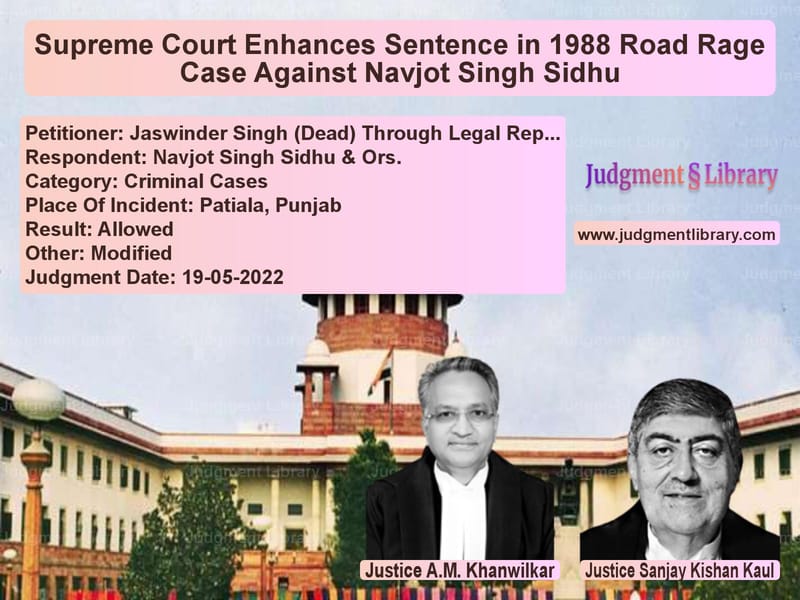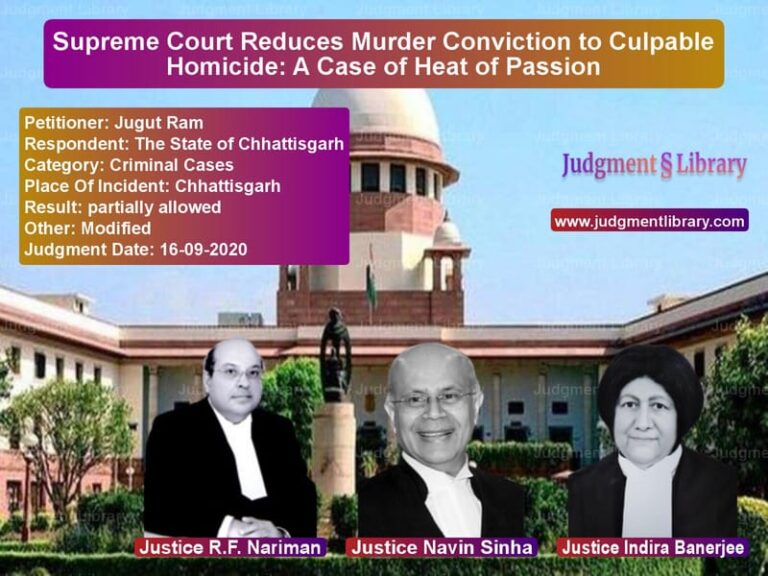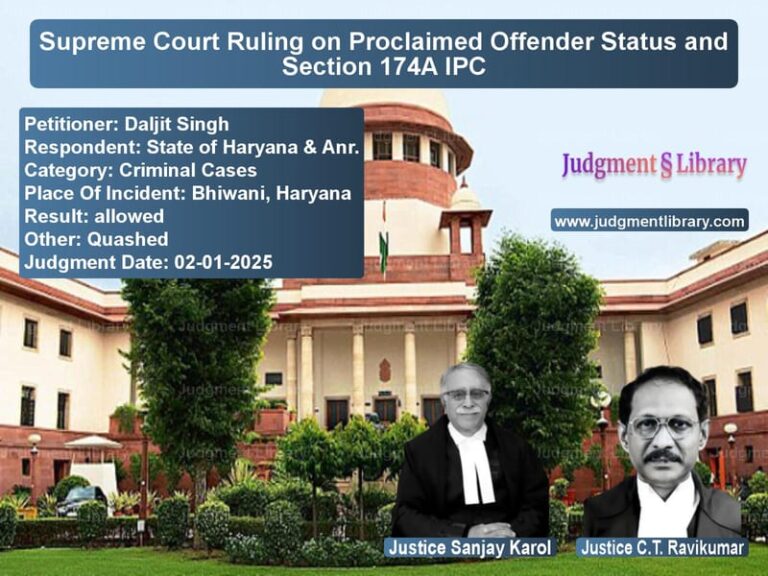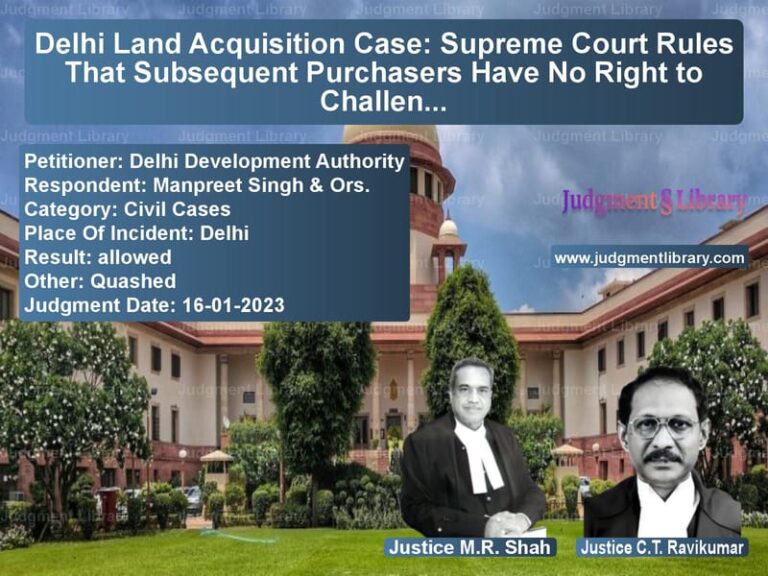Supreme Court Enhances Sentence in 1988 Road Rage Case Against Navjot Singh Sidhu
The Supreme Court of India has delivered a landmark ruling in the case of Jaswinder Singh (Dead) Through Legal Representative vs. Navjot Singh Sidhu & Ors., significantly altering the sentence imposed in a long-standing road rage case. This case revolved around the death of Gurnam Singh following an altercation involving the renowned cricketer and politician Navjot Singh Sidhu.
In its judgment, the Court enhanced Sidhu’s sentence from a mere fine of ₹1,000 to one year of rigorous imprisonment. The decision underscores the principle that mere passage of time does not dilute the severity of a crime and highlights the growing emphasis on victim rights in criminal jurisprudence.
Background of the Case
The incident occurred on December 27, 1988, when an altercation took place at Battian Wala Chowk, Patiala. The victim, Gurnam Singh, was traveling with his associates when he was allegedly assaulted by Sidhu and his associate, Rupinder Singh Sandhu. Witnesses claimed that Sidhu pulled Gurnam Singh out of his vehicle and delivered fist blows, leading to his collapse. He was later declared dead at the hospital.
The case took several turns over the decades, with Sidhu initially being acquitted by the trial court in 1999. However, upon appeal, the Punjab and Haryana High Court convicted him under Section 304 Part II IPC (culpable homicide not amounting to murder), sentencing him to three years of rigorous imprisonment.
In 2007, the Supreme Court overturned this conviction, reducing it to a mere charge under Section 323 IPC (voluntarily causing hurt) and imposing only a fine of ₹1,000. Dissatisfied with the leniency, the victim’s family filed a review petition, which has now resulted in the enhancement of the sentence.
Key Legal Issues
- Whether the sentence imposed by the Supreme Court in 2007 was too lenient given the nature of the crime.
- Whether the mere passage of time (34 years since the incident) should impact the severity of the punishment.
- Whether a single fist blow leading to death can warrant enhanced sentencing.
- Whether the victim’s family had the right to seek a review of the sentence under victim rights jurisprudence.
Arguments Presented
Petitioner’s (Jaswinder Singh’s Legal Representative) Arguments
- The sentence imposed in 2007 (₹1,000 fine) was grossly inadequate for an act that led to the death of a person.
- The victim, Gurnam Singh, was an elderly man (65 years old) who was assaulted by a much younger, physically stronger Sidhu.
- The sentence failed to act as a deterrent, allowing Sidhu to go unpunished despite his direct role in causing the victim’s death.
- There was no legal justification for treating the case as mere voluntarily causing hurt when the act resulted in a fatality.
Respondent’s (Navjot Singh Sidhu) Arguments
- The incident was spontaneous and not premeditated.
- There was no use of a weapon, and the death occurred due to natural causes rather than direct injuries.
- The case was 34 years old, and Sidhu had already undergone the legal process for decades, making further punishment excessive.
- Enhancing the sentence would be an unfair exercise of judicial power as there had already been multiple rounds of litigation.
Supreme Court’s Observations and Ruling
1. The Passage of Time Does Not Diminish Criminal Liability
The Supreme Court ruled that merely because the case was decades old did not mean that the punishment should be diluted. The judgment stated:
“The delay of 34 years cannot be a ground to acquit the accused when the delay was not attributable to the complainants or the victims.”
2. Severity of Assault Must Be Considered
The Court emphasized that the force of a blow matters, particularly when inflicted by a physically strong individual on an elderly victim:
“Sidhu was a young, athletically fit international cricketer who knowingly used his strength to inflict a blow on a 65-year-old man. The physical disparity must be considered.”
3. Victim’s Rights Cannot Be Ignored
The judgment acknowledged the increasing role of victim impact statements and held that criminal proceedings must consider the suffering of the victim’s family:
“Justice is due to the accused, but justice is also due to the victim. The sentence should not be manifestly inadequate in cases where the crime has resulted in loss of life.”
4. Enhanced Sentence of One Year Rigorous Imprisonment
The Supreme Court enhanced Sidhu’s sentence to one year of rigorous imprisonment, holding:
“Considering the gravity of the offense and the principle of proportionality, a fine of ₹1,000 alone is inadequate. We impose a sentence of one year of rigorous imprisonment.”
Impact of the Judgment
This ruling has far-reaching implications for criminal law and sentencing policy in India.
1. Strengthening the Sentencing Framework
The judgment emphasizes that courts must ensure proportionality in sentencing, particularly in cases of violent crimes leading to death.
2. Recognizing Victim Rights
The ruling reaffirms that victims and their families have a right to seek justice, including through the review of inadequate sentences.
3. Setting a Precedent for Road Rage Cases
The case sets a strong precedent for road rage incidents, ensuring that physical violence leading to death is treated seriously.
4. Caution for Public Figures
The judgment sends a clear message that celebrity status or social position will not shield individuals from the consequences of their actions.
Conclusion
The Supreme Court’s ruling in Jaswinder Singh (Dead) Through Legal Representative vs. Navjot Singh Sidhu & Ors. is a landmark judgment that reinforces accountability in violent crimes. By enhancing the sentence, the Court has upheld the principle that criminal acts, irrespective of the passage of time, must be punished proportionately. This ruling will serve as a guiding principle in future cases involving road rage, violent altercations, and victim rights in the Indian legal system.
Petitioner Name: Jaswinder Singh (Dead) Through Legal Representative.Respondent Name: Navjot Singh Sidhu & Ors..Judgment By: Justice A.M. Khanwilkar, Justice Sanjay Kishan Kaul.Place Of Incident: Patiala, Punjab.Judgment Date: 19-05-2022.
Don’t miss out on the full details! Download the complete judgment in PDF format below and gain valuable insights instantly!
Download Judgment: jaswinder-singh-(dea-vs-navjot-singh-sidhu-&-supreme-court-of-india-judgment-dated-19-05-2022.pdf
Directly Download Judgment: Directly download this Judgment
See all petitions in Murder Cases
See all petitions in Bail and Anticipatory Bail
See all petitions in Judgment by A M Khanwilkar
See all petitions in Judgment by Sanjay Kishan Kaul
See all petitions in allowed
See all petitions in Modified
See all petitions in supreme court of India judgments May 2022
See all petitions in 2022 judgments
See all posts in Criminal Cases Category
See all allowed petitions in Criminal Cases Category
See all Dismissed petitions in Criminal Cases Category
See all partially allowed petitions in Criminal Cases Category







